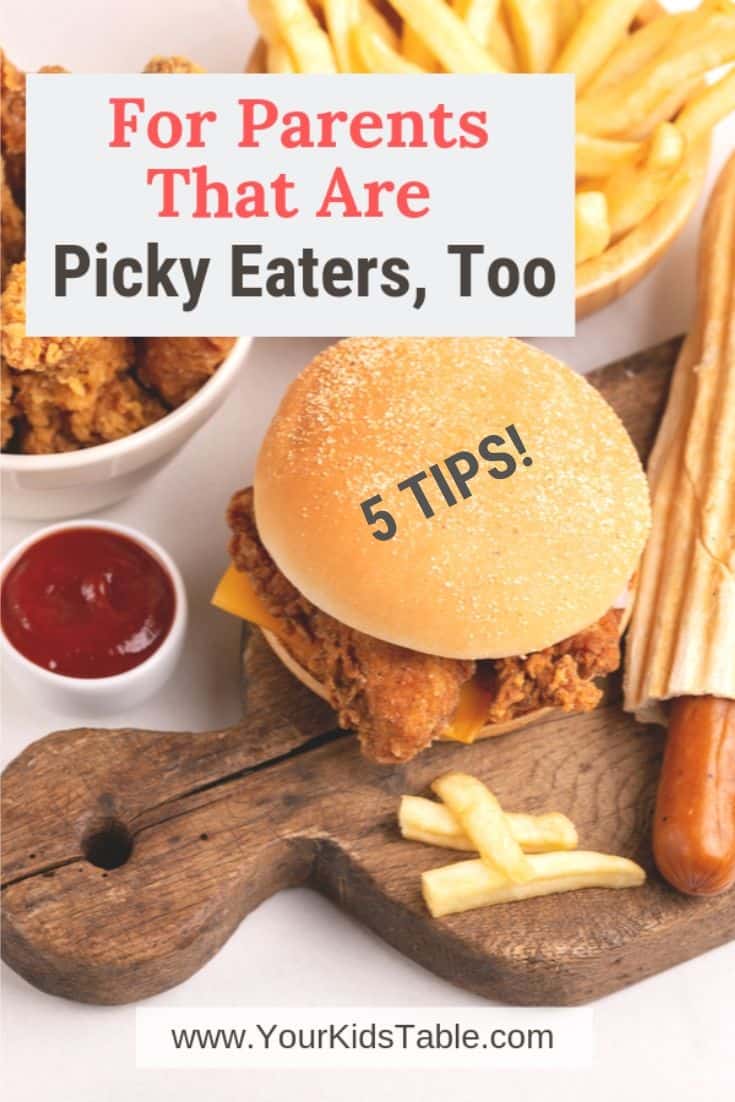How can you help your child picky eater when the parent is an adult picky eater? Learn how adults can learn to enjoy new foods even after a lifetime of being picky and how to make sure your picky eating doesn’t make your child’s any worse!
If you’ve got a picky eater, than you know that every single meal can be a challenge.
And, if you follow some of my strategies, like spacing meals or stopping short order cooking, you might have been hesitant because those changes are out of your comfort zone about food.
Helping your child overcome picky eating can affect the whole family, ultimately for the better.
But, for some of you, there’s another wrinkle to the picky eating obstacle: YOU or your spouse/partner is also a picky eater.
It suddenly highlights a frustration you’d rather not deal with head on, but can’t help but acknowledge because you’re also facing a limited amount of food choices for you or your partner.
It feels like a lot to juggle.
While I haven’t treated adults directly for picky eating, I’ve seen real change in my former picky eating husband, and in the spouses of some of my Mealtime Works students.
In this post, I want to share what’s worked for us, so that you can help yourself or the adult picky eater in your life!
It’s Not a Coincidence…
…That you and your child are both picky eaters. I don’t have any hard statistics on exact percentages, but it’s VERY common for me to hear from parents that they or their child’s other parent is also a picky eater.
How can this be?
It goes back to the fact that you didn’t accidentally cause your child to only eat 5 different types of food. There’s a reason they’re a picky eater, an underlying medical, oral-motor, or sensory issue that caused you or your spouse to be a picky eater in the first place is probably at least a part of the reason your child is also so selective about their foods. Head to Why Kid’s Don’t Eat to learn more.
In this case, the cliche is true, the apple doesn’t fall far from the tree.
Picky Eating Adults Is No Joke
Just like kids that are picky eaters, there’s quite a range for adults too. You’ll find the average adult that just doesn’t like his green veggies, that would be my father-in-law. Other than that though, he’s a pretty adventurous eater.
But, an adult can also be quite limited in what they’ll eat too. Some adults don’t care and will easily brush off comments and jabs about their limited food choices.
After 7 years of writing here on Your Kid’s Table though, I know for some adults it goes much deeper than that. I never expected to get comments from adults asking for help, but I do! As adults, they understand what a healthy diet looks like and they know they’re not even close to eating it.
They want to eat different foods, but can’t.
They struggle with going to parties, traveling, and dinner dates.
They don’t brush off the snarky picky eater comments and want to feel better about the food they’re putting into their body, but don’t know how.
The point is that even as an adult, the picky eating struggle is real.
Affiliate links used below. See our full disclosure.
Can a Picky Eating Adult Learn to Eat New Foods
I believe it’s possible to overcome picky eating as an adult, and while not a lot of people are doing the work to help adults, Conquer Picky Eating for Teens and Adults: Activities and Strategies for Selective Eaters by Katja Rowell MD and Jenny McGlothlin MS, SLP can be a good starting point. In this workbook style guide, you’ll work towards uncovering what the root is of your picky eating and ways to start to changing it.
And, just like when I’m helping a family with a child picky eater, I have the same important advice: think in baby steps.
We tend to imagine having to eat stuffed salmon with a side of katamala olives, sauerkraut, and brussel spouts. You freeze and can’t move forward because eating that or any other meal somebody in your life wishes you would enjoy, seems impossible.
The truth is that in this moment, it just might be nearly impossible.
Start small. As small as you need to.
How Adult Picky Eaters Can Learn to Eat Different Foods

Are you wondering what small steps you or your spouse/partner should start with? I’ve got some tips to help adult picky eaters, and they work right alongside how to help the child picky eater!
1. Change how you talk to yourself about food.
Picky eaters often look at a food and think, “Oooh gross! That looks slimy/weird/flavorful/bland/etc. No thank you.” Instead, as soon as you hear your own self talk about food, stop and ask yourself if that’s helping you try new foods.
Hint: It isn’t.
Then, try on some different thoughts, like, “I’ve never really looked at that food before, I wonder what it tastes like.” Notice you’re not being overly positive, and you don’t have to try that food just yet, but allow yourself to wonder.
It’s sounds like a subtle change, but this opens your brain up to eventually trying and enjoying the new food instead of shutting it down in an instant. When you allow yourself to be open to trying a food, or at least not hating it, you’re setting yourself up to like those new foods!
2. Identify why you don’t like it!
Start to pay attention to the foods you refuse to eat. What is it that you don’t like. Is it the smell, the color, or how it looks?
Try to just interact with the food a little more instead of just jumping into eating a bite. If the texture looks gross, just try touching it or bringing it to your nose to take a whiff. Imagine what it might taste like and tell yourself, “This will taste different and it might take some time to get used to.”
3. Focus on “easier” foods
If smells really bother you, don’t start by trying to eat that sauerkraut, rather, start scrolling through Pinterest and look at pictures of food. Does anything leave you feeling a little curious? Or, maybe think back to a time you were at a restaurant or party and you were slightly interested in a food. Maybe you saw a food that didn’t totally disgust you.
Try interacting with eating those foods before you move onto foods that are more challenging for you because of how they look, feel, smell, or taste.
4. Think about what you’re tasting
There are two foods I really don’t care for: raisins and olives. It’s been that way my whole life. But, I’d like to learn to like them, as I’ve done with several other foods.
When I take a bite of an olive, I’m already anticipating that I’m not going to like them and if I’m not careful, that’s all that I’m thinking about. So instead, I try to change my thought to “What does this taste like?” It’s sort of a little science experiment.
Since I’m focusing on the taste and texture, I can think of it more objectively, and experience it in a different way.
It also helps to take small bites, to take those bites on your back teeth where there’s far less sensory receptors, and have a glass of water ready to take a quick drink.
5. Try it 20 times!
The truth is that the first time you try a food it might be rough, still not tasting good to you. But, you can’t stop there. When we repeatedly try something we get used to it. And studies show it takes at least 12 times to know if we truly don’t like something.
I’ve seen this work in my own adult life as I learned to love mushrooms, yogurt, and salmon. All foods I couldn’t stand as a child and teenager.
Be creative about how you cook or prepare the food. Sometimes, eating a food mixed in with something else or as a dip can help. My friend makes a super tasty olive dip that I love.
If you like crackers, try some on top of crackers. If you love noodles, mix a little in.
Just don’t give up until you’ve tried at least 20 times!

How to Make Sure You Don’t Make Your Kid’s Eating Any Worse
Besides improving your own picky eating, when you’ve got kids at the table, you’ll want to be thoughtful about what you’re saying and doing in front of them. If your kid hears you or your spouse say, “Oh my gosh, broccoli again? You know I hate broccoli!” Then, as a picky eater themselves, they’re going to think that kind of talk is totally acceptable.
It will give them even more ammunition, in a situation where they’re already holding all the cards.
Here’s a quick run down of tips so that you don’t make your kid’s picky eating any worse:
- Never verbalize what you like and don’t like. It just doesn’t need said. As with the example above, we don’t want to teach our kids how to complain about food, and we also don’t want them to feel pressure by eating foods you enjoy and gushing over how good they are in an attempt to have your child try the same food.
- Follow the same rules you’re asking of your child. If you space apart meals, eat at the same time they are. If you’re going to have some chips in between meals, you’ll have to allow them to do the same.
- Put foods you don’t eat on your plate. If your child sees you eating the same thing all the time, they’ll eventually notice. So instead, take some of the food, even if it’s just a little, so they see you’re interacting with different foods.
As I finish up this post, I’m hopeful that those adults that wish they ate more foods and weren’t so picky will have some new found direction! It is possible, you’re in the driver’s seat.
And, think about the impact improving your eating will have on your picky eating child! The silver lining to being a picky eating parent is that you understand why your child is so picky. Better than anyone else.
That’s an amazing support!
If you’re looking for more help, check out my free workshop to help picky eaters. You’ll learn my top 3 tips to turn the table on picky eating for good.
Click here to grab a free seat (it’s all online)
More for Picky Eating Adults
Will Your Child Outgrow Picky Eating: The Surprising Truth
10 Extreme Picky Eating Red Flags that You Need to Know
5 Tips That Gave Me More Time to Help My Picky Eater
Alisha Grogan is a licensed occupational therapist and founder of Your Kid’s Table. She has over 14 years experience with expertise in sensory processing and feeding development in babies, toddlers, and children. Alisha also has 3 boys of her own at home. Learn more about her here.

